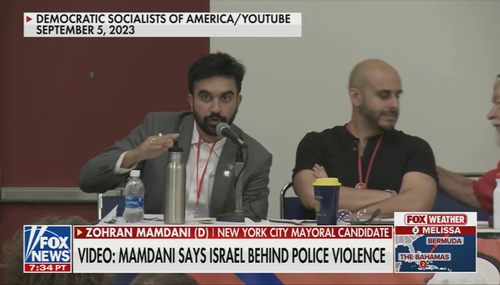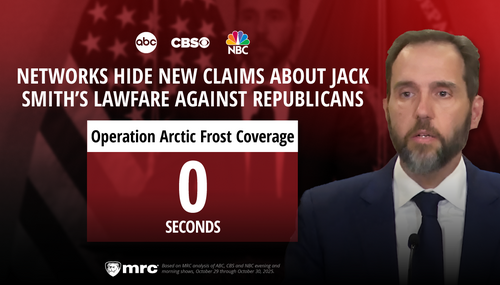In an attempt to guilt the United States into accepting Syrian refugees, in an August 24 article, New York Times columnist Nicholas Kristof compared their plight to that of Jews during the Holocaust and claimed “Anne Frank Today is a Syrian Girl.”
Appearing on MSNBC’s Andrea Mitchell Reports on Tuesday, the liberal journalist claimed America had blood on its hands: “I think we all think that, you know, Anne Frank and European Jews were simply murdered because the Nazis regarded them as inferior, and in some sense, that's true, but it's also true that they died because mainstream America in some sense regarded them as inferior as well, and as unworthy of helping.”
He then extended the same logic to the war in Syria: “And, you know, in retrospect, those kind of arguments, or the notion that, you know, ‘Europeans should look after their own first, this is isn't our responsibility,’ they look not only silly, but just morally myopic. And I'm afraid that we will some day look back at the kind of arguments we are making to explain our unwillingness to help Syrians in the same way.”
Host Andrea Mitchell began the exchange by touting Kristof’s thesis: “And you’ve analogized it to Anne Frank. How Otto Frank, her father, tried to get the family out in the 30s and of course because of anti-Semitism and quotas could not get her here....That's the analogy really to the immigration debate we're having now about Syrian refugees and the so-called “extreme vetting,” as Donald Trump would call it.”
He rejected the obvious difference between the two circumstances:
I mean, one of the main objections was, look, Anne Frank, if she had been admitted, wouldn't have been blowing up Americans. And you know, in fact, there is a certain parallel there. One reason we didn't admit Anne Frank is that we were afraid of people like her. That we were afraid that Jews if they were admitted were going to be communists, were going to be anti-government, were going to dismantle our government. Or alternatively we also worried that they were going to be Nazis in disguise. And we were fighting a world war, we thought we had to put security above all else. And so in fact, those kind of arguments seem to be more of a parallel than a difference.
Kristof also bashed his readers for supposedly caring more about the passing of his dog than the welfare of refugees: “And so my inbox and my Twitter feed was swamped with really wonderful, warm-hearted condolences about and sympathies for Katie's loss. And a lot of really hard-hearted responses about Syrian kids. You know, ‘It's not our job to help them. Who cares about them?’” He concluded: “...this frankly callousness toward 470,000 Syrians who are believed to have died so far, sort of underscored to me the degree to which what we have is not a problem of lack of policy responses, it's fundamentally a lack of empathy for those in need.”
Mitchell praised his nasty attacks: “Nicholas Kristof, thanks so much for bringing us all back to the heart and to our moral values.”
Here is a full transcript of the segment:
12:25 PM ET
ANDREA MITCHELL: The 10,000th Syrian refugee has now arrived in the United States, meeting a goal that the Obama administration set last year. Close to five million Syrians have fled their country since the civil war began. But according to the State Department, only one fifth of 1% have landed here in the U.S. Joining me now is New York Times columnist Nicholas Kristof, who wrote the editorial “Anne Frank Today is a Syrian Girl.” Nick, thanks very much for joining us.
NICHOLAS KRISTOF: My pleasure.
MITCHELL: You've raised an issue, crystallized an issue that has also been addressed by the extraordinary pictures coming out of Aleppo in particular. Yet, the world doesn't seem to respond. And you’ve analogized it to Anne Frank. How Otto Frank, her father, tried to get the family out in the 30s and of course because of anti-Semitism and quotas could not get her here. There were so many barriers. That's the analogy really to the immigration debate we're having now about Syrian refugees and the so-called “extreme vetting,” as Donald Trump would call it.
KRISTOF: That's right. I mean, I think we all think that, you know, Anne Frank and European Jews were simply murdered because the Nazis regarded them as inferior, and in some sense, that's true, but it's also true that they died because mainstream America in some sense regarded them as inferior as well, and as unworthy of helping. And if you look at the kind of arguments that were made in the 1930s, including frankly at this newspaper, at The New York Times – I mean, we published a front page article warning about the dangers of admitting Jewish refugees from Europe. And, you know, in retrospect, those kind of arguments, or the notion that, you know, “Europeans should look after their own first, this is isn't our responsibility,” they look not only silly, but just morally myopic. And I'm afraid that we will some day look back at the kind of arguments we are making to explain our unwillingness to help Syrians in the same way.
MITCHELL: What kind of reaction did you get to the editorial?
KRISTOF: You know, I got – I mean one of the – I got a lot of resistance, perhaps not surprisingly. I mean, one of the main objections was, look, Anne Frank, if she had been admitted, wouldn't have been blowing up Americans. And you know, in fact, there is a certain parallel there. One reason we didn't admit Anne Frank is that we were afraid of people like her. That we were afraid that Jews if they were admitted were going to be communists, were going to be anti-government, were going to dismantle our government. Or alternatively we also worried that they were going to be Nazis in disguise. And we were fighting a world war, we thought we had to put security above all else. And so in fact, those kind of arguments seem to be more of a parallel than a difference.
MITCHELL: In fact, according to the State Department, or UNHCR, 75% of the refugees who are trying to get in are women and children. We're not talking about, you know, about people who in any sane analysis would be threatening –
KRISTOF: And you look at Canada. Canada has managed to admit, you know, three times as many, and Canadians, as far as we can tell, seem to be desperate to have more Syrians move to their communities. You know, obviously we can't exclude the risk that any person admitted may indeed be inclined to terrorism or that their children may not. Absolutely there are risks. There are risks in everything that we do. And if you look at the number of people admitted as refugees since 9/11, who have actually ever supported any kind of terrorism, it's minuscule. So it seems to me that if one weighs the risk of terrorism against the enormous humanitarian imperative to help people who are desperate, than in the 1930s, that should have been impelled us to help Anne Frank and today that should impel us to be more generous towards Syrian refugees as well.
MITCHELL: And Nick, before I let you go, I want to ask you about another one of your columns, where you talked about the death of your dog, Katie, and you asked the rhetorical question in the headline, “Do You Care More About a Dog Than a Refugee?” Because you got so much sympathy for your column about Katie.
KRISTOF: Yeah, I mean, it so happened that I had a column about Syrians on the same day that Katie died. And so my inbox and my Twitter feed was swamped with really wonderful, warm-hearted condolences about and sympathies for Katie's loss. And a lot of really hard-hearted responses about Syrian kids. You know, “It's not our job to help them. Who cares about them?” This kind of thing. And it – the juxtaposition of this incredibly warm-hearted response to the loss of one dog at age 12, with this frankly callousness toward 470,000 Syrians who are believed to have died so far, sort of underscored to me the degree to which what we have is not a problem of lack of policy responses, it's fundamentally a lack of empathy for those in need.
MITCHELL: Nicholas Kristof, thanks so much for bringing us all back to the heart and to our moral values. Thank you, appreciate it.
KRISTOF: Thank you.




